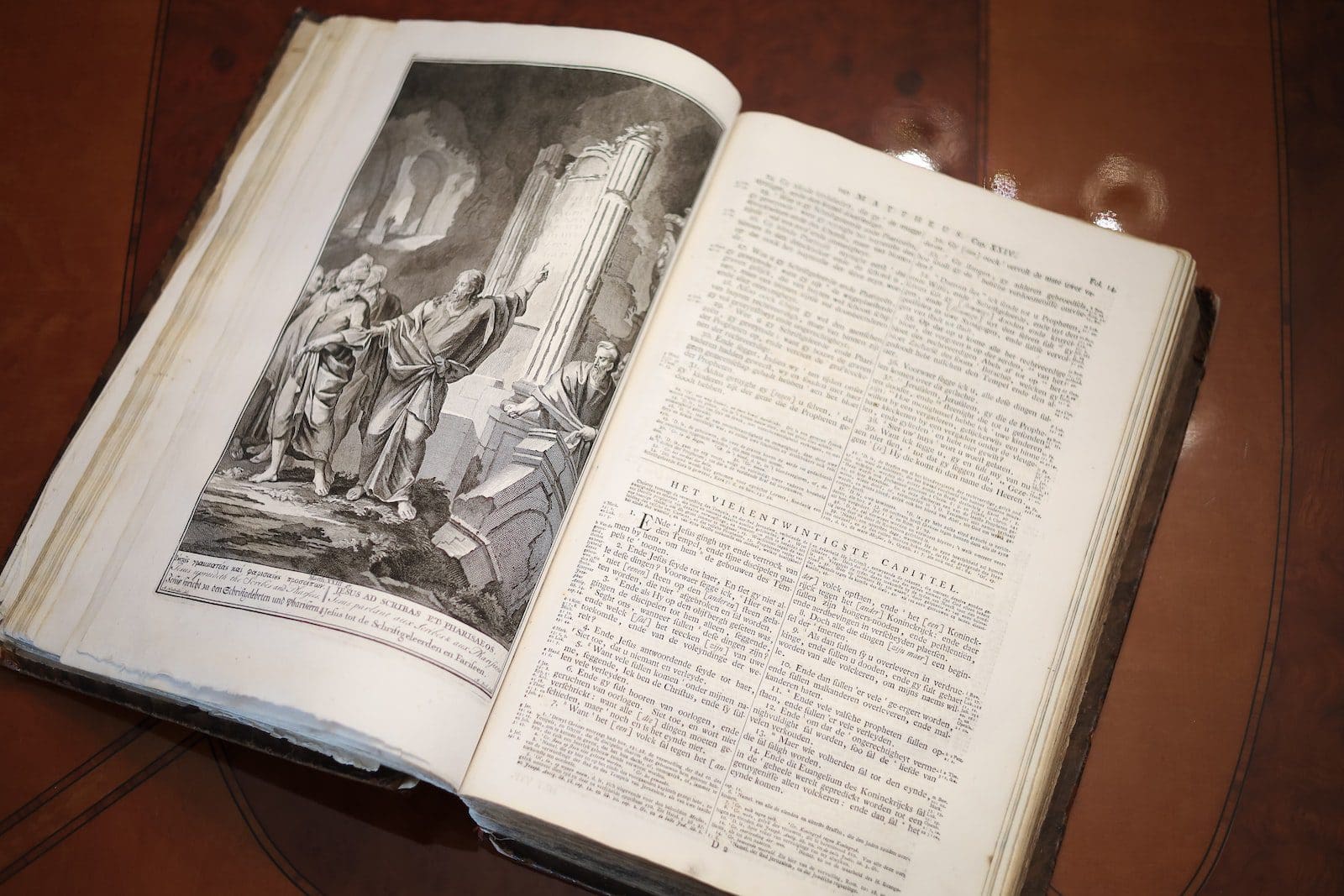Since time immemorial, we have had professions that have been associated with the work of writing down laws, interpreting them, and imposing them. These professions were given names and, at times, emerged as power-yielding groups.
Scribes and Pharisees are two distinct groups of people who were associated with the tasks of interpreting the law and of imposing laws, respectively.
Key Takeaways
- Scribes were professional copyists and teachers of Jewish law.
- Pharisees were a Jewish sect that strictly followed the law and believed in the resurrection of the dead.
- Scribes were not necessarily Pharisees, but Pharisees had scribes among their ranks.
Scribes vs Pharisees
The difference between Scribes and Pharisees is that the former were people whose task was limited to interpreting the Bible, whereas the latter were an elite class who influenced the law. Scribes and Pharisees also differed in their roles, the civilizations they were a part of, and so on.

Scribes, as the name suggests, were a group of people whose profession was writing and, at times, interpreting the laws of the Bible.
Scribes were associated with tasks that involved administration and having a thorough knowledge of the established laws, the legal language, its interpretation, etc.
Pharisees, on the other hand, were known to belong to an educated class. They were people who were included in the elite class.
Pharisees were political and religious leaders who influenced the common folk. Yet another task of theirs was to impose written laws on the people.
They were alleged to have misinterpreted the Bible and the laws therein.
Comparison Table
| Parameters of Comparison | Scribes | Pharisees |
|---|---|---|
| Definition | Scribes were a group of common people whose work was to write. | Pharisees were known to be religious and political leaders. |
| Role | Their role and profession were to write and perform tasks that were administrative. | The Pharisees were an elite class who had a hold over the imposition of the written text. |
| Presence | The scribes, as a group, have been prevalent in all times and civilizations. | Their presence has been specific in Palestine after the time when Jews became rulers in 165 BCE. |
| Hierarchy | Scribe as a profession was hierarchical as well as could be learned by the already existing scribes. | Pharisees could only be the people who were already a part of the old elite Pharisee families. |
| Knowledge | Scribes had to have legal knowledge in order to draft and write laws. | Pharisees did not require any special knowledge, but they were expected to be leaders. |
What are Scribes?
A Scribe is referred to as a person who is adept at writing and is familiar with legal terms and language. Scribes were in demand back in time.
As opposed to the laborious manual work that the people had to do, a scribe’s job entailed more mental labor, and hence they were a respected group.
Having its origin in Ancient Greece, scribe as a profession was required to frame laws and even interpret them. In earlier times, people used signs to identify objects, and this tradition was taken up in fields of commerce, architecture, and other avenues.
The profession, with time, became a hierarchical one.
The kind of script or symbols initially used were cuneiform in appearance. This meant that the characters were wedge-shaped.
Apart from being used in areas of commerce, scribes at times wrote down stories and tales about the lives of the people in general. These documents have come to be very useful in knowing about the early periods and the life of the people that existed then.
According to the Bible, the function of scribes was of clerical nature. All they were required to do was rewrite and record royal orders and manuscripts.
Later, the profession spread far and wide across the entire globe. Scribes were supposed to be wise men who could write and interpret documents.

What are Pharisees?
Pharisees were a group of intellectual people. These people belonged to an elite upper class.
They were respected as they were religious and political leaders. They had the ability to impose the law on the common people.
They had the authority to interpret the law that the Jews followed.
This was a group of people that came to action in Palestine only after the Jews had overtaken the power of the former Greek rulers. The timeline of this event can be placed somewhere after 165 BCE.
It was possible only for the individuals of the old Pharisee families to become Pharisees. Anyone outside of the family could hold such a position.
In the New Testament, the group of Pharisees has been described to be in conflict with Jesus and His Apostles. It is believed that they interpreted the laws in a wrongful and hence fell into tiffs and conflicts with Christ and his followers.
Theirs was not a profession but a position that had immense power to impose the laws.
The word Pharisee means ‘the separate one.’ This was because the Pharisees thought of themselves as a superior body. Their duties included studying, doing charity, and spreading the word of the Lord around.
It was their role to ensure that the common folk followed the rules that had been laid by the Almighty.

Main Differences Between Scribes and Pharisees
- Scribes were a group of people whose profession was mainly writing, whereas Pharisees were an elite group of political and religious leaders.
- Scribes needed to be adept at writing, drafting, and being familiar with legal knowledge, whereas Pharisees need not necessarily possess the skill of writing.
- Scribes had the role of recording and interpreting laws, whereas Pharisees worked to impose the already laid down laws on the general public.
- While scribe as a profession was hierarchal and could be learned, one could be a Pharisee only if one belonged to an already existing Pharisee family.
- Scribe as a profession spread far and wide into almost all civilizations, but on the other hand, the Pharisees tradition remained specifically associated with Palestine in 165 BCE.

- https://brill.com/downloadpdf/book/9789004378414/B9789004378414_s026.pdf
- https://books.google.com/books?hl=en&lr=&id=9X1Vc393iPAC&oi=fnd&pg=PA3&dq=%22Scribes%22&ots=odDu7ltqVR&sig=f7MUhhwda9QZ-WX5ssUsNiHmF5U

This article offers a thorough examination of the profession of scribes and the elite class of pharisees, providing valuable insights into their respective roles and influence.
This is a very enlightening article that clearly explains the difference between scribes and pharisees, as well as their importance in ancient civilizations.
I couldn’t agree more, Cook Mark. The level of detail and historical context provided is truly impressive.
Absolutely, Cook Mark. The article effectively captures the significant roles of scribes and pharisees in ancient society.
The article offers a compelling examination of the historical roles and influence of scribes and pharisees, providing a comprehensive understanding of their contributions to ancient societies.
The historical context and detailed comparison of scribes and pharisees in various aspects make this article an invaluable resource for understanding their roles in ancient civilizations.
Absolutely, Jackson Karen. The level of depth and precision in the article’s content is truly praiseworthy.
The detailed explanation of the origins and functions of scribes and pharisees offers a comprehensive understanding of their contributions to ancient societies.
I couldn’t agree more, Tyler94. The depth of knowledge presented underscores the importance of these influential groups.
Absolutely, Tyler94. The article effectively highlights the significance of scribes and pharisees in shaping historical and legal aspects of ancient civilizations.
This article offers a comprehensive and insightful perspective on the historical significance of scribes and pharisees, shedding light on their roles and influence in ancient societies.
Well said, Yrose. The article provides a thorough understanding of these influential groups and their impact on ancient history.
The comparison table is particularly useful in understanding the key differences between scribes and pharisees in a comprehensive manner.
I completely agree, Cholmes. It serves as a handy reference to differentiate between these two important groups.
Yes, Cholmes. The detailed comparison of their roles, knowledge, and historical presence is remarkably insightful.
The detailed exploration of the origins and roles of scribes and pharisees is both informative and intriguing, illustrating their unique contributions to ancient civilizations.
I agree, Ismith. The emphasis on historical context and cultural impact adds significant value to the article’s content.
The article provides a comprehensive overview of the functions and significance of scribes and pharisees, offering valuable insights into their historical roles and impact.
The article does an excellent job of shedding light on the historical significance and evolution of scribes and pharisees in various civilizations.
I couldn’t have said it better, Saunders Edward. The depth of information provided is commendable.
Absolutely, Saunders Edward. The historical context adds a valuable layer of understanding to the roles of scribes and pharisees.